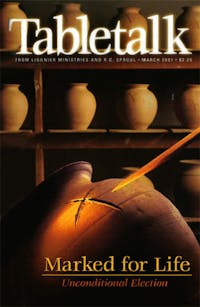
Request your free, three-month trial to Tabletalk magazine. You’ll receive the print issue monthly and gain immediate digital access to decades of archives. This trial is risk-free. No credit card required.
Try Tabletalk NowAlready receive Tabletalk magazine every month?
Verify your email address to gain unlimited access.
I spent a number of years in Christian ministry before I came to the Reformed faith. I recall one occasion when I was witnessing to members of a cult, one devoted to works of righteousness, and my presentation of grace successfully provoked the same objection that Paul had to answer in the sixth chapter of Romans: “If what you are saying is true, then why don’t we get to sin up a storm?” I was presenting the same Gospel Paul preached, and, not surprisingly, it provoked the same reaction.
But there was one objection that I never provoked. During all that time, no one ever said to me, “Wilson, if what you are saying is true, then why does God still find fault with us? For who can resist His will?” (Rom. 9:19). It was only after I came to a Reformed understanding of grace that I discovered why people never said anything that resembled verse 19 to me—it was because I never said verse 18. As soon as I affirmed verse 18 (and, in some cases, as soon as I hinted at it), I couldn’t get people to stop bringing the issue up.
The point here is not to answer this particular objection to election, at least not to anyone’s satisfaction. The central point is to state the fact of this objection and its essential identity with the objection Paul had to handle. Paul anticipated this objection, which no doubt meant that he had been in more than one discussion in the back of more than one synagogue after one of his sermons on the sovereignty of God. Those who want to reject a Reformed understanding of these chapters have an exegetical responsibility that I have never seen them assume. This responsibility is to show how their interpretation of these chapters could possibly provoke this objection. The reason they have difficulty doing this is because their exegesis of the passage is actually driven by the objection and hence cannot be an adequate response to it. They have more sympathy with Paul’s nameless objector than they do with Paul.
None of this is said with an intent to disparage, because the problem really is a thorny one. I can attest that it had me by the throat for years. All of us feel the impulse to raise the objection. It seems pre-eminently reasonable, at least initially. When I finally came to the Reformed faith, one of the first to raise it to me was my oldest daughter, who was in sixth grade at the time. In our table talk, we were working through these great issues. And now here it is in someone else’s Tabletalk.
But the objection, at the heart, is not an objection to Calvinism. In principle, it is an objection to the Christian faith, not to the Reformed faith, and the ultimate target is not the doctrine of election but the doctrine of creation. The Bible teaches that God will judge the world. But the world He will judge is in the condition it is in because He created it. He made it. And who can resist His will? Both sides of the debate acknowledge that He created it (irresistibly) knowing full well what would happen when He did. For both Calvinists and Arminians, God looked at all of human history, all the pain and suffering, all the unbelief, all the stumbling blocks, and, having seen it all, He still said, “ ‘Let there be light.’ ” When we have all the parties speak into the microphone, we see that every form of orthodox Christianity provokes the objection, at least in principle.
Some, in what could be called “the openness of God” movement, have sought to get around this problem of evil and judgment by maintaining that God does not know the future. But this solves no problems at all. The doctrines of creation and providence still mean that God made the world the way it is, that He lets the world be the way it is right now, and that He will judge the world for being the way it is. Process theologians (who are not friends of orthodoxy) have charged the “open” theists with radical inconsistency at this point. If the charge against God is that He created the world the way it is and hence cannot rightly judge it, it is no solution at all to blindfold Him before He creates. Will we insist that He keep the blindfold at the judgment as well? Given the spirit of this objection, the spirit revealed in Romans 9:19, the only way out is to deny that God created the world. We should look for this as an upcoming development in “neo-evangelical” theology.
We can find peace, however, if we heed Paul’s response to all this. He is the apostle, and he knows how this whole thing is to be handled. He tells all us “uppity pots” to keep our lids on. God made us, and it follows from this that He knows what He is doing. Shall the pot say to the potter, “Whoa! Who told you that you know how to do this? Let me see your diploma from an accredited pottery academy”? God made us, He created us. We in our pride see this as the problem. But it is the solution. He is the Creator. And we are not.
